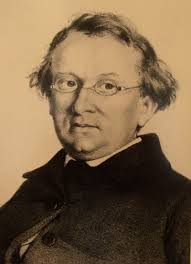
Eduard Mörike
Ludwigsburg , 8. September 1804 – Stuttgart, 4. Juni1875
Illustration: Hannes Binder
Um Mitternacht
Gelassen stieg die Nacht ans Land,
Lehnt träumend an der Berge Wand,
Ihr Auge sieht die goldne Waage nun
Der Zeit in gleichen Schalen stille ruhn;
Und kecker rauschen die Quellen hervor,
Sie singen der Mutter, der Nacht, ins Ohr
Vom Tage,
Vom heute gewesenen Tage.
Lehnt träumend an der Berge Wand,
Ihr Auge sieht die goldne Waage nun
Der Zeit in gleichen Schalen stille ruhn;
Und kecker rauschen die Quellen hervor,
Sie singen der Mutter, der Nacht, ins Ohr
Vom Tage,
Vom heute gewesenen Tage.
Das uralt alte Schlummerlied,
Sie achtet's nicht, sie ist es müd;
Ihr klingt des Himmels Bläue süßer noch,
Der flücht'gen Stunden gleichgeschwungnes Joch.
Doch immer behalten die Quellen das Wort,
Es singen die Wasser im Schlafe noch fort
Vom Tage,
Vom heute gewesenen Tage.
Sie achtet's nicht, sie ist es müd;
Ihr klingt des Himmels Bläue süßer noch,
Der flücht'gen Stunden gleichgeschwungnes Joch.
Doch immer behalten die Quellen das Wort,
Es singen die Wasser im Schlafe noch fort
Vom Tage,
Vom heute gewesenen Tage.
Éjfél
Megjött az éj, s merengve áll
a hegynek támaszkodva már,
s a nagy idő aranyló mérlege
nem leng. Egyenlő súllyal van tele.
S hetykén duruzsolnak, - a hold kiragyog, -
anyjuknak, az éjnek, a friss patakok
a napról,
az elpihenő mai napról.
Egy ős gyerekdalt döngicsél
a víz, de unja már az éj,
a csengő égi kék, az vonzza őt,
azt kedveli, az illanó időt.
S álmos patakok puha medreikben
tovább duruzsolnak azért szelíden
a napról,
az elpihenő mai napról.
Fordította: Radnóti Miklós
s a nagy idő aranyló mérlege
nem leng. Egyenlő súllyal van tele.
S hetykén duruzsolnak, - a hold kiragyog, -
anyjuknak, az éjnek, a friss patakok
a napról,
az elpihenő mai napról.
Egy ős gyerekdalt döngicsél
a víz, de unja már az éj,
a csengő égi kék, az vonzza őt,
azt kedveli, az illanó időt.
S álmos patakok puha medreikben
tovább duruzsolnak azért szelíden
a napról,
az elpihenő mai napról.
Fordította: Radnóti Miklós
U ponoć
Spokojno kroči noć u svet,
na gorski oslonjena splet,
vremena zlatne terazije sad
gleda, i njinog ravnomjerja sklad;
a obesnih vrela javlja se roj
što materi noći žubore poj
o danu,
o maločas minulom danu.
Ne voli ona drevnu tu
uspavanku, nit sluša nju;
nebeska plavet njoj je slađi zvuk,
časova hitrih ujednačen luk.
Al žubor se vrela ne gubi nit mre,
i u snu još pevaju vode ko pre
o danu,
o maločas minulom danu.
Prevod: Velimir Živojinović
At Midnight
Serene, the night came over the land,
Leans on the mountain face and dreams,
Her eye beholds the golden scales now
Time at rest, balanced motionless;
More boldly now the springs gush forth,
They sing to the mother, to the night, to hear
About the day,
About the day that was.
That ancient old lullaby,
She heeds it not, 'twas heard too oft,
Sweeter the sound of the heavenly blue,
Of the fleeing hours evenly-arched yoke.
Yet the springs prevail as always they do,
The waters go on singing in their sleep
About the day,
About the day that was.
Serene, the night came over the land,
Leans on the mountain face and dreams,
Her eye beholds the golden scales now
Time at rest, balanced motionless;
More boldly now the springs gush forth,
They sing to the mother, to the night, to hear
About the day,
About the day that was.
That ancient old lullaby,
She heeds it not, 'twas heard too oft,
Sweeter the sound of the heavenly blue,
Of the fleeing hours evenly-arched yoke.
Yet the springs prevail as always they do,
The waters go on singing in their sleep
About the day,
About the day that was.
Translation: Charles L. Cingolani
Nincsenek megjegyzések:
Megjegyzés küldése